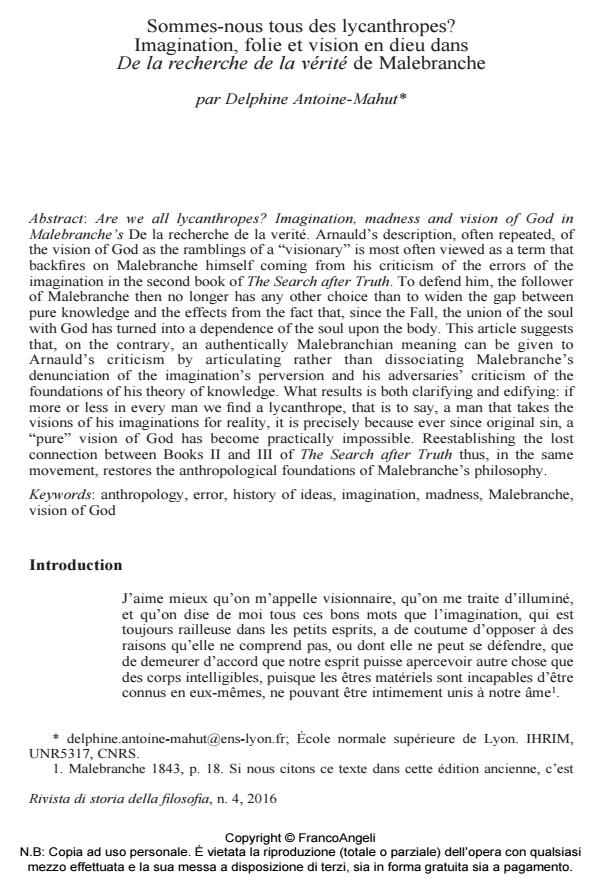Are we all lycanthropes? Imagination, madness and vision of God in Malebranche’s
Journal title RIVISTA DI STORIA DELLA FILOSOFIA
Author/s Delphine Antoine-Mahut
Publishing Year 2016 Issue 2016/4
Language French Pages 15 P. 677-691 File size 55 KB
DOI 10.3280/SF2016-004008
DOI is like a bar code for intellectual property: to have more infomation
click here
Below, you can see the article first page
If you want to buy this article in PDF format, you can do it, following the instructions to buy download credits

FrancoAngeli is member of Publishers International Linking Association, Inc (PILA), a not-for-profit association which run the CrossRef service enabling links to and from online scholarly content.
De la recherche de la verité. Arnauld’s description, often repeated, of the vision of God as the ramblings of a "visionary" is most often viewed as a term that backfires on Malebranche himself coming from his criticism of the errors of the imagination in the second book of The Search after Truth. To defend him, the follower of Malebranche then no longer has any other choice than to widen the gap between pure knowledge and the effects from the fact that, since the Fall, the union of the soul with God has turned into a dependence of the soul upon the body. This article suggests that, on the contrary, an authentically Malebranchian meaning can be given to Arnauld’s criticism by articulating rather than dissociating Malebranche’s denunciation of the imagination’s perversion and his adversaries’ criticism of the foundations of his theory of knowledge. What results is both clarifying and edifying: if more or less in every man we find a lycanthrope, that is to say, a man that takes the visions of his imaginations for reality, it is precisely because ever since original sin, a "pure" vision of God has become practically impossible. Reestablishing the lost connection between Books II and III of The Search after Truth thus, in the same movement, restores the anthropological foundations of Malebranche’s philosophy.
Keywords: Anthropology, error, history of ideas, imagination, madness, Malebranche, vision of God
- The great guide to the preservation of life: Malebranche on the imagination Colin Chamberlain, in British Journal for the History of Philosophy /2025 pp.515
DOI: 10.1080/09608788.2024.2349086
Delphine Antoine-Mahut, Sommes-nous tous des lycanthropes? Imagination, folie et vision en dieu dans De la recherche de la vérité de Malebranche in "RIVISTA DI STORIA DELLA FILOSOFIA" 4/2016, pp 677-691, DOI: 10.3280/SF2016-004008